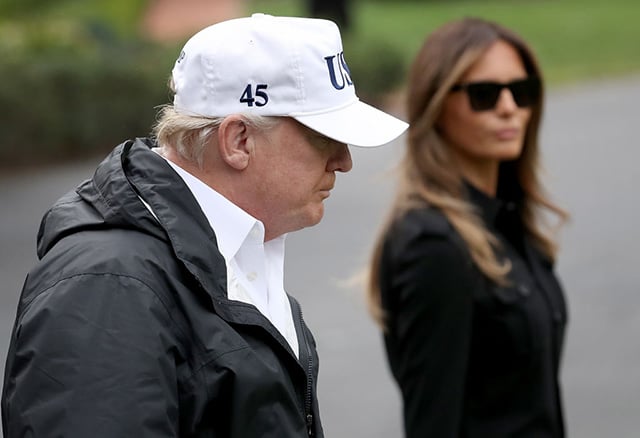
Honest, paywall-free news is rare. Please support our boldly independent journalism with a donation of any size.
Seven days after Donald Trump announced his intention to seek the highest office in the land, he formed more business entities than he had on any previous day, available information indicates.
All the entities were related to Trump projects in Indonesia.
A few months later, Trump was joined on the campaign trail by a delegation of Indonesian politicians — who openly acknowledged they were there because of Trump’s investments in their country. One had previously been caught on tape soliciting a $4 billion bribe.
In total, Trump has formed at least 49 business entities since he announced his bid for the presidency. He continued to form businesses not only after winning in November, but also after assuming the presidency in January.
A detailed examination of Trump’s financial disclosure forms, as well as Delaware and New York business filings, shows that Trump’s run for president likely began as more of a marketing pitch than a genuine attempt to become the leader of the free world. The problem is, he won. And it doesn’t appear his priorities have changed.
He did virtually nothing to separate himself from his businesses. In 2016, Trump owned a direct stake in more than 380 business entities — and held an indirect stake in many more. After becoming president, he transferred those direct ownership stakes to six different entities, mostly Delaware holding companies. But the transfer of ownership was meaningless; a revocable trust that was created to benefit him — and that he can assume control of at any time — sits at the center of it all.
Our current president has two jobs: leader of the free world and the owner of hundreds of business entities worldwide. The combination is toxic for democracy.
More than 70 percent of Trump’s businesses are incorporated in Delaware — a state known for anonymity and secrecy. There is often very little information on the Delaware business filings. And the ambiguity and imprecision of the federal financial disclosure form filed with the Office of Government Ethics makes it difficult to discern the detailed financial health of the president or his businesses.
For example, Trump is not required to disclose net income from his businesses (as opposed to gross revenue). This raises the prospect that Trump’s businesses may be hemorrhaging money in years that he reported hundreds of millions of dollars of income. Further, the disclosure guidelines allow Trump to report liabilities totaling just hundreds of millions when the real number may be in the billions.
Trump’s tax returns — which he has refused to release — would provide the detail needed to determine the extent of his conflicts of interest.
Throughout his business career, Trump has been a boom-and-bust businessman — filing for Chapter 11 bankruptcy protection 11 times. If his business approaches another bust moment while he is president, it is hard to imagine Trump — who has exhibited so little restraint both as a businessman and now as president — not succumbing to the temptation to use the powers of his office to benefit his private interests.
In many ways, the Trump presidency is the natural culmination of the decades-long stranglehold of wealthy individuals and corporations over public policy. But Trump has taken the standard model a step further: He has cut out the middleman — the lowly elected official — who by Trump’s own admission typically needed to be greased to make the whole process work. As president, Trump now has immense power to dictate policy and direct funds to his businesses, or to others who in turn can repay him through his businesses.
The fact that he is still in control of his business is enough alone to invite corruption. If a CEO travels to Washington, D.C., to lobby Trump, the CEO may stay at Trump’s D.C. hotel to curry favor with the president. “Where are you staying?” may be the first question the president asks.
Trump’s financial disclosures reveal roughly 500 active business entities around the globe that trace back to him. As such, the disclosures provide a menu from which wealthy individuals or corporations, foreign or domestic, friend or foe, can select their preferred vehicle to ingratiate themselves to, or gain leverage over, the president of the United States.
It’s a recipe for disaster. And it’s hard to imagine it ending any other way.
Holding Trump accountable for his illegal war on Iran
The devastating American and Israeli attacks have killed hundreds of Iranians, and the death toll continues to rise.
As independent media, what we do next matters a lot. It’s up to us to report the truth, demand accountability, and reckon with the consequences of U.S. militarism at this cataclysmic historical moment.
Trump may be an authoritarian, but he is not entirely invulnerable, nor are the elected officials who have given him pass after pass. We cannot let him believe for a second longer that he can get away with something this wildly illegal or recklessly dangerous without accountability.
We ask for your support as we carry out our media resistance to unchecked militarism. Please make a tax-deductible one-time or monthly donation to Truthout.